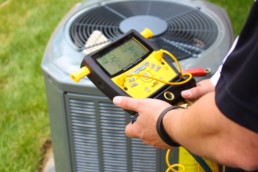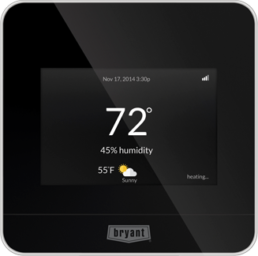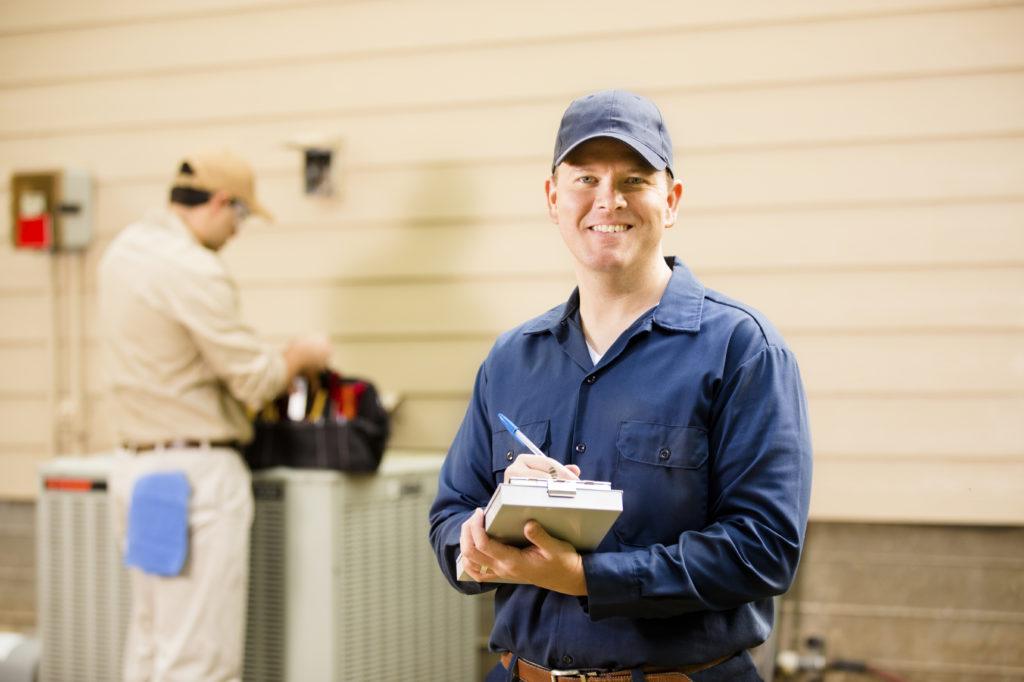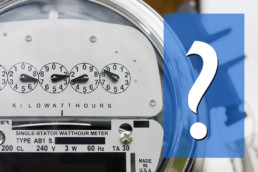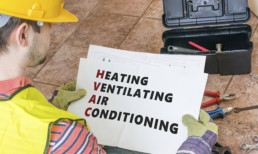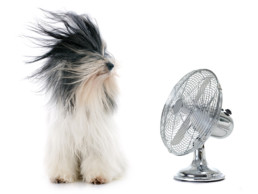Top 10 Questions to Ask Your Potential HVAC Contractor
Finding an HVAC contractor in your city won't be difficult to do. There are more than 100,000 HVAC contractors in the country today, which means there should be more than a few options in your general area.
But finding the best HVAC contractor? That's a different story! Since there are so many HVAC contractors, you'll need to do your homework to find the right one to provide you with HVAC services.
One way to do it is by asking HVAC questions to as many contractors in your city as you can find. This will help you narrow down your search and show you which HVAC contractors are worth your time.
Here are 10 questions to ask potential HVAC contractors.
1. How Long Have You Been an HVAC Contractor?
If an HVAC contractor just started working on HVAC systems last week, they're not the best option for you. An HVAC contractor doesn't necessarily need 50 years under their belt to perform most HVAC services, but that doesn't mean you should trust someone with no experience, either.
One of your first HVAC questions should be about an HVAC contractor's experience level. You want to know that they'll know what they're doing while working on your home's HVAC system.
2. Are You Fully Licensed and Insured?
You should not, under any circumstances, work with an HVAC contractor that isn't fully licensed and insured.
Ask for an HVAC contractor's business license number and tell them you need to see a copy of their HVAC insurance policy. If they hesitate to provide you with either of these things, move on to your next option.
3. Do You Work With Residential or Commercial Clients?
There are some HVAC contractors who specialize in working on the HVAC systems in homes. There are others who work exclusively on HVAC systems in businesses. Some also do some combination of both.
Assuming you need an HVAC contractor for your home, you should check to see that the HVAC contractor you're speaking with deals with homeowners on a regular basis.
4. What HVAC Services Do You Offer?
Most HVAC contractors offer the same basic services. They can help you install, maintain, and repair any aspect of your HVAC system.
But some also offer services that are outside the normal scope. For example, some HVAC contractors will do air duct cleaning for you and improve your indoor air quality.
If you need services like these, it's always a good idea to ask an HVAC contractor if they're capable of providing them. Not all of them are up for the challenge.
5. How Much Do Your HVAC Services Cost?
Cost shouldn't be your No. 1 concern when you're looking for an HVAC contractor. That's why we didn't put cost as the top question on this list of HVAC questions.
But you will obviously want to consider how much an HVAC contractor charges to, say, install a new air conditioner in your home. The national average for a new AC unit installation is about $5,000, but different HVAC contractors in your area will charge different amounts.
Feel free to ask about the costs associated with each service an HVAC company provides.
6. Do You Offer Any Warranties or Guarantees?
When hiring an HVAC contractor, you want someone who will stand behind their work. They should extend warranties and/or guarantees on the products and services they sell. This will give you an unparalleled peace of mind when you work with a contractor.
7. What Are Your Business Hours?
Most good HVAC contractors do more than just work 9 to 5 every day. More often than not, they'll put in long hours to make sure their customers are satisfied. They'll even come out to your home after-hours if you need them to.
8. How Fast Could You Come to My Home?
Do you have an emergency situation on your hands that requires the attention of an HVAC contractor right away? Or do you want to make sure your new AC is installed before next week when your family comes into town?
Talk to your HVAC contractor about whether or not they can provide you with prompt services. You may have to pass on working with a perfectly good HVAC contractor because they're not able to send someone to your home fast enough.
9. Can You Provide References?
In 2019, it's never been easier for homeowners to track down online reviews for HVAC contractors. You can find dozens of reviews for the HVAC contractors in your area by conducting a simple Google search.
But you can also ask HVAC contractors themselves to provide you with reviews and set you up with the names and numbers of a few references. It helps to know what other people have had to say about a contractor before hiring them to do a job.
10. What Sets You Apart From Your Competition?
As we mentioned earlier, there will be no shortage of HVAC contractors in your area trying to attract your business. They'll all tell you that they're better than the next contractor and able to provide you with superior services.
Have them tell you what sets them apart from the other HVAC contractors that you've spoken to. They should talk at length about how they have an outstanding reputation in the area and strive to keep their customers 100 percent satisfied.
The answer to this question, coupled with all the others, will let you know whether or not an HVAC contractor means business.
Ask These HVAC Questions to Different Contractors
Ask five or ten HVAC contractors in your area the HVAC questions found here.
When you do, we don't think that any of them will give you the same great answers that we will. We're committed to our customers and promise to provide you with the best possible HVAC products. We guarantee all the work that we do and make it our mission to leave our customers happy with our services.
Contact us today to schedule an appointment or to ask any questions you might have about our extensive HVAC experience.
What Should I Look For In A HVAC Company?
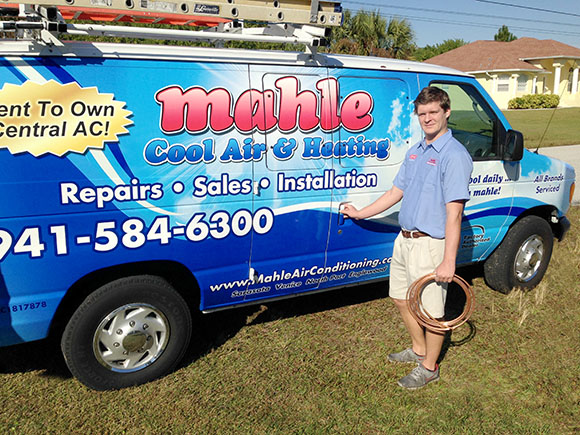
It can be very difficult to find a good HVAC company. Many people find themselves looking through countless ads in the yellow pages or online and are still unable to find what they are looking for. Fortunately, knowing exactly what to look for in a HVAC company will make the decision a lot easier. Below is a list of things you should look for in a HVAC company:
Good Reputation
You should choose a HVAC company that has a good reputation. One of the ways that you can find out about a HVAC company's reputation is by checking out the Better Business Bureau website. The Better Business Bureau is an organization that gives businesses ratings on a scale from A+ to F.
Licensed
You should select a HVAC company that is licensed. HVAC companies must meet the minimal training requirements before they are given a license. They must also pass a written examination.
Liability Insurance
All HVAC companies should have liability insurance. The purpose of liability insurance is to protect the customer if the contractor happens to get injured while they are at your home. Because the purpose of liability insurance is to protect you, you definitely want to choose a company that has it.
Properly Certified
The HVAC company you choose should be certified by the North American Technical Excellence organization. This is an independent organization that certifies companies in the HVAC industry. If a company has been certified by this organization, then you will be able to rest assured that it meets the necessary qualifications.
Referrals
Before you hire a HVAC company, you should ask for their references. They should be able to provide you with at least three. Ask questions about the type of service that you received from the company. You should also ask them if they would use the company again.
The Cost
Any type of HVAC service can be costly. That is why the cost is something you should ask about before you select a HVAC company. However, you should not choose a company just because it offers a lower cost. Many companies that are not licensed or insured offer low-cost services.
Surveys Your Home Before Giving You A Cost
In order to give you an accurate cost on your service, an HVAC technician will need to survey your home. This includes things such as checking your air ducts for leaks. You should not select a company that will give you an estimation over the phone without coming to your home first. Some companies will give you one cost and then jack up the cost after they come to your home.
Does Not Discourage You From Buying Higher-Efficiency Equipment
Contractors should stay up-to-date with the latest HVAC equipment. If a contractor tells you not to buy higher-efficiency equipment, then they probably do not know how to install it. A good HVAC company will be able to tell you about the latest HVAC equipment and how much money you can save with it.
Belongs To A Professional HVAC Organization
If a company belongs to a professional organization, then they most likely do quality work. Air Conditioning Contractors Of America is an example of a professional organization. You can find out whether a HVAC company is a member of that organization by visiting the website.
Sells High-Quality Products
The quality of the product is one of the factors that determines how long it will last. You should make sure that your contractor sells Energy Star products. Those products not only last a long time, but they can also help you save money on your energy bill.
New Programmable Thermostats Offer Larger Energy Savings
Regardless of the temperatures outside, your household can be comfortable year-round when the thermostat is properly set. As technology continues to improve, HVAC systems respond with digital control panels and advanced temperature sensors. Currently, you can use your AC thermostat to save money when you know how to program it. Take a look at the clever strategies possible today, and you'll see your electrical bill dramatically drop.
Cold, Weekday Settings
When winter's chill sets in, you might automatically turn the heater up. However, your home doesn't have to be warm and toasty when everyone is at school or work. To save money during the winter weekdays, set the thermostat to 56 degrees Fahrenheit. The home has some warmth to it in order to keep everything from freezing without conditioned air circulating inside. When everyone returns home, the thermostat can be set at a higher temperature. This low, 56-degree F. temperature can save a family hundreds of dollars throughout the year because most households are empty for about eight hours each weekday. That's a long time period for money savings with the right thermostat setting.
A Full Household on Cold Nights
 Dinnertime and the early evening hours should be warm in your home, so turn the thermostat to 68 degrees F. during this time. The temperature change is a small one so that the HVAC system doesn't work too hard to warm the space back up. If anyone is chilly, they can always wear a sweater or cuddle under a blanket as they watch television. As everyone goes to sleep, the thermostat should be turned down to the upper 50s again. There's no need to keep the home really warm when everyone is in bed and under thick blankets.
Dinnertime and the early evening hours should be warm in your home, so turn the thermostat to 68 degrees F. during this time. The temperature change is a small one so that the HVAC system doesn't work too hard to warm the space back up. If anyone is chilly, they can always wear a sweater or cuddle under a blanket as they watch television. As everyone goes to sleep, the thermostat should be turned down to the upper 50s again. There's no need to keep the home really warm when everyone is in bed and under thick blankets.
Summertime Programming
Ideally, you should use the same thermostat strategy during the summer. When everyone is at home and the exterior temperatures are rising, the thermostat should be set to 78 degrees F. This temperature may seem high, but you can counteract any discomfort with ceiling and desk fans. Fans will always used less energy than the HVAC system and save you money. As everyone leaves for the day, set the thermostat for the mid-80s. The home won't be too warm when everyone returns. The HVAC system doesn't work as hard to cool the home with no one inside, and money savings are the result.
Learning Thermostats
If you have an AC thermostat that's 10 years or older, consider a small investment in a learning model. Many thermostat models today have microprocessors that actually "learn" about your favorite temperature settings. If you diligently lower the temperature around 8 a.m. each weekday as you leave for work, the system notes this in their programming. One morning, however, you may forget to set the thermostat. In response, the system automatically sets itself for your favorite temperature. This helpful response can save you a lot of money over time. At some point, you may rarely set the system because it's learned all of your preferred settings.
Remote-Access Systems
If you want more control over your energy use, look for remote-access systems. Your AC thermostat can have WiFi connectivity. When you're at work or school, you can log into your account through an Internet connection. Turn the thermostat up or down whenever the weather changes drastically outside. Controlling your system from any location allows you to save on energy costs. You don't have to worry if you forgot to turn off the AC, and arrive home to either frigid or hot conditions. Simply log in and access the system's current power level. With the swipe of a finger, you're always in control.
Calling your trusted HVAC company on a regular basis can help you save money too. These technicians can explain the latest programming options and service the system simultaneously. A well-maintained system combined with the right programming will increase the AC components' lifespans and keep you comfortable every day of the year.
Troubleshooting Air Conditioning Problems: Obstructions Matter
An Issue Some Homeowners Forget
When they encounter problems with a malfunctioning or noisy air conditioning unit, homeowners sometimes forget to check the exterior of the residence. Don't overlook this location! Obstructions around external air conditioning machinery pose problems sometimes.
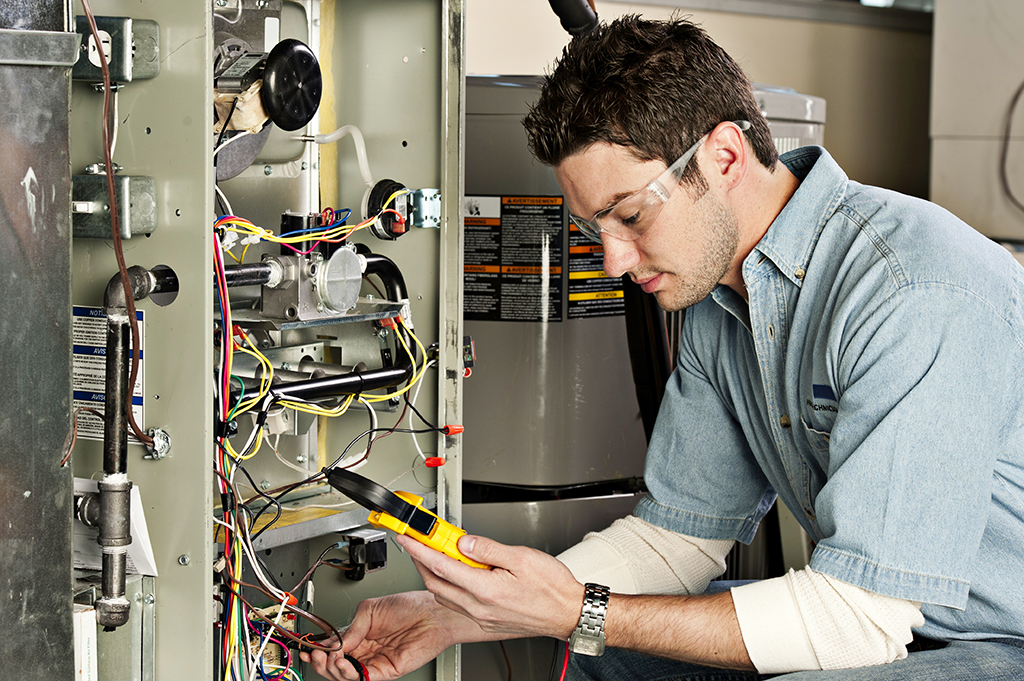
Especially in very warm, sunny, humid climates where gardeners enjoy vigorous plant growth, vegetation may grow rapidly. Florida falls within this category of tropical spots. The wonderful climate in this area promotes robust greenery. Snowbirds, in particular, need to take precautions to prevent air conditioning problems caused by unnoticed obstructions.
For optimum AC unit operation, you should not permit anything to clog or block the exterior of your home air conditioning unit. You'll maintain a much safer premises by taking steps to check this issue periodically.
A Helpful Checklist
One useful step that may assist you in helping to detect problems caused by obstructions proves very simple. Keep a checklist handy. Review these items on a periodic basis:
1. Has sand, cobwebs or debris covered the outside of your air conditioning unit?
2. Do any items of furniture sit too close to the unit to permit safe operation?
3. Has a storm window become an obstruction to a window air conditioner?
4. Have trees, shrubs, grass, climbing vines or other plants begun obstructing the unit?
5. Do household blinds or drapes sometimes blow outside and come into contact with exterior air conditioning equipment?
6. Has trash blown into the area and created an obstruction hazard?
7. Does an exterior fixture, such as a swinging porch or a doghouse, stand too close to the exterior of the unit?
By remaining alert and checking these issues frequently, you'll detect some possible problems before they can cause damage to your air conditioner. The simple step of performing this home maintenance on a regular basis helps promote safer, more efficient cooling. Simply remove obstructions to keep air flows circulating better.
Unavoidable Obstructions
How should a conscientious homeowner handle an unavoidable obstruction? Some older houses in Florida, in particular, may not enjoy efficient window air conditioning units as a result of structural issues. Architects decades ago planned some of these lovely structures without taking highly automated modern home cooling systems into consideration.
One step that might prove helpful in this situation involves reviewing the location of your air conditioning unit carefully. For instance, if your window air conditioning unit or swamp cooler once stood unobstructed, but now sits clogged among mature trees and vines that you would prefer not to remove, re-locating the air conditioner makes sense. The extent of your ability to take this type of corrective action may depend mainly upon the design of the residence.
The Best Sites For Relocated Air Conditioning Units
In a room with a window air conditioner and multiple windows, the issue of finding another site for the unit may not pose a problem. In fact, simply by changing the location of the AC equipment to an unobstructed window, you may enjoy much better air flows inside and outside the home.
Try and find a place for your air conditioning unit that enjoys its own dedicated electrical outlet. Many older units require a lot of electricity. Depending upon the wiring in your residence, you may find that plugging in a vacuum cleaner to a connected outlet will sometimes blow a fuse if the air conditioner operates at the same time.
In the Venice and Sarasota area of South Florida, our company helps residents requiring assistance with these issues. We offer state-of-the-art technology that can provide a solution to this widespread problem. We'll help you discover the best options for cooling your home or office in Florida cost-effectively and efficiently. Call or Text us today for more details (941) 203-7955 and don't forget to check out our specials, financing, and rent-to-own air conditioning options. Stay Cool with Mahle!
Putting Off AC Maintenance Will Cost More In The Long Run
Upgrading your HVAC unit can be a significant expense for your family’s budget. For this reason, you may be putting off purchasing a new HVAC system for as long as possible.
The old adage ‘If it is not broke, do not fix it’ may apply to many situations. However, in the case of HVAC systems, you should replace your old system before it breaks down.
According to the experts at Energy Star, your air conditioner or heat pump unit should be replaced every 10 years. The reason is technological advances make newer HVAC units more efficient than ever. Efficient units can save homeowners hundreds of dollars in utility costs each year.
By using an older HVAC system to heat and cool your home, you are literally blowing your money out of the window. You may be saving money on the purchase price of a new unit, but each month you are spending more money on utility costs. Older HVAC systems are inefficient and wasteful.
HVAC units are only as good as their efficiency as they perform their functions. Each unit is given an efficiency rating by Energy Star known as SEER. For example, units that were installed prior to 2005 have a SEER rating of less than 10.
To put these numbers into perspective, a SEER-9 system that is upgraded to a SEER-13 system can save your family 38 percent in utility costs per year. That is a significant saving.
In 2005, the Department of Energy mandated that all HVAC units have a SEER number that is no less than 13. This legislation by the federal government is an effort to improve energy efficiency in households throughout the United States.
Understanding SEER
SEER stands for Seasonal Energy Efficiency Rating. This is a metric system that was devised to determine the efficiency of an HVAC unit. If a SEER number is high, then it is determined to have a greater level of efficiency. You can purchase an HVAC unit as high as SEER-23.
A simple formula is used to determine the SEER number of an HVAC unit. The calculation that determines the efficiency of your HVAC unit is the number of BTUs divided by the number watts in the system.
The SEER numbers represent the potential efficiency of an HVAC unit. They are not exact measurements that will determine how the HVAC unit will perform in your home.
Factors such as the climate of your geographical area, the size of your home and the quality of your air ducts can determine the actual SEER performance of your unit. At any rate of performance, it will not be less than SEER-13.
Purchasing a New Unit
Before you go to your local ‘big box’ hardware store to purchase a unit with the highest SEER number possible, there are factors that should be considered.
- HVAC units should be purchased according to the size that is right for your home.
- High SEER numbers may not be appropriate for your heating and cooling needs.
- HVAC efficiency can be affected if it is improperly installed.
- Regular maintenance affects your actual SEER number.
Installing Your New HVAC Unit
You might be tempted to install the unit yourself or get it installed by a family friend who performs unlicensed HVAC work. Resist the urge to do so.
Since your HVAC's SEER number and efficiency will be affected by improper installation, you should hire an HVAC company using the following guidelines. All HVAC technicians who install high-efficiency equipment should be certified and experienced.
Experienced HVAC technicians will be able to examine your home and current HVAC system to help you determine a SEER system that is appropriate for your circumstances. If you purchase a system that is not right for your home, you will lose efficiency regardless of the SEER number.
HVAC Efficiency
Although SEER numbers play an important role in your HVAC system's efficiency, a higher number does not mean the unit is better. Our technicians at Mahle Cool Air and Heating will help you find the best unit that suits your home and budget. Call or Text us today for more details (941) 203-7955 and don't forget to check out our specials, financing, and rent-to-own air conditioning options.
Does a Better SEER Rating Mean a Better Air Conditioner?
Upgrading your HVAC unit can be a significant expense for your family’s budget. For this reason, you may be putting off purchasing a new HVAC system for as long as possible.
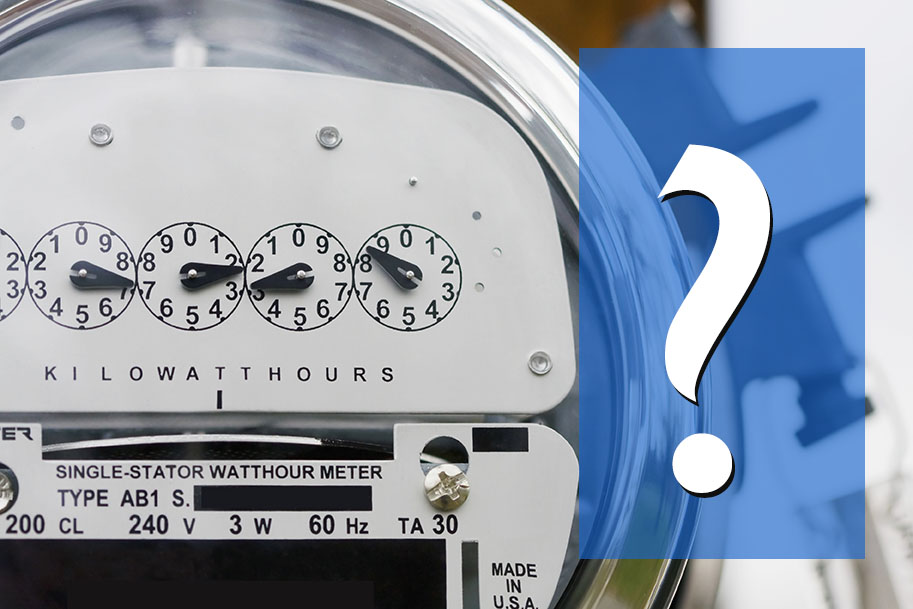
The old adage ‘If it is not broke, do not fix it’ may apply to many situations. However, in the case of HVAC systems, you should replace your old system before it breaks down.
According to the experts at Energy Star, your air conditioner or heat pump unit should be replaced every 10 years. The reason is technological advances make newer AC units more efficient than ever. Efficient units can save homeowners hundreds of dollars in utility costs each year.
By using an older system to cool your home, you are literally blowing your money out of the window. You may be saving money on the purchase price of a new unit, but each month you are spending more money on utility costs. Older heat pumps and cooling systems are inefficient and wasteful.
Each heating and cooling model form every manufacturer is given an efficiency rating by Energy Star known as SEER. For example, units that were installed prior to 2005 have a SEER rating of less than 10.
To put these numbers into perspective, a SEER-9 system that is upgraded to a SEER-13 system can save your family 38 percent in utility costs per year. That is a significant savings.
In 2005, the Department of Energy mandated that all heating and cooling equipment have a SEER number that is no less than 13. This legislation by the federal government is an effort to improve energy efficiency in households throughout the United States.
Understanding SEER
SEER stands for Seasonal Energy Efficiency Rating. This is a metric system that was devised to determine the efficiency of an HVAC unit. If a SEER number is high, then it is determined to have a greater level of efficiency. SEER ratings go as high as SEER-23.
A simple formula is used to determine the SEER number of an HVAC unit. The calculation that determines the efficiency of your HVAC unit is the number of BTUs divided by the number watts in the system.
The SEER numbers represent the potential efficiency of an HVAC unit. They are not exact measurements that will determine how the air conditioner or heat pump will perform in your home.
Factors such as the climate of your geographical area, the size of your home and the quality of your air ducts can determine the actual SEER performance of your unit. At any rate of performance, it will not be less than SEER-13.
Purchasing a New Air Conditioner or Heat Pump
Before you go to your local ‘big box’ hardware store to purchase a unit with the highest SEER number possible, there are factors that should be considered.
- HVAC units should be purchased according to the size that is right for your home.
- High SEER numbers may not be appropriate for your heating and cooling needs.
- HVAC efficiency can be affected if it is improperly installed.
- Regular maintenance affects your actual SEER number.
Installing Your New HVAC Unit
You might be tempted to install the unit yourself or get it installed by a family friend who performs unlicensed HVAC work. Resist the urge to do so.
Since your SEER number and efficiency will be affected by improper installation, you should hire a company using the following guidelines. All HVAC technicians who install high-efficiency equipment should be certified and experienced.
Experienced technicians will be able to examine your home and current HVAC system to help you determine a SEER system that is appropriate for your circumstances. If you purchase a system that is not right for your home, you will lose efficiency regardless of the SEER number.
HVAC Efficiency
Although SEER numbers play an important role in your HVAC system's efficiency, a higher number does not mean the unit is better. Our technicians at Mahle Cool Air and Heating will help you find the best unit that suits your home and budget. Call or Text us today for more details (941) 203-7955 and don't forget to check out our specials, financing, and rent-to-own air conditioning options. Stay Cool with Mahle!
Types Of Air Purifiers for Your Home

Air purifiers are convenient household devices that, as their names suggest, purify and cleanse the air. They accomplish this by extracting contaminants from out of the air. Air purifiers can be helpful to all people but are often considered to be especially positive for those who have asthma or those who have allergies. If you're thinking about purchasing an air purifier for your residence, you should review all of the options that are available to you. You can also contact our reputable family-run HVAC company for more information. Our Venice-based business has NATE certification and also is a Bryant dealer with factory authorization. When it comes to air purifiers, we truly know our stuff.
There are numerous options are effective whole-house filters.
Pleated filters are one option. These types of filters are adept at obstructing microscopic particles that are particularly harmful to the lung tissue. If this sounds interesting to you, look for a pleated filter that's electrostatically charged. These kinds of pleated filters are terrific for drawing in typical allergens such as pet dander and pollen. Although these filters sometimes cost a bit more than others, they're generally totally worth the extra money.
Ultraviolet filters are also available. These whole-house filters are a smart option for those who are generally most concerned about the presence of germs. Ultraviolet light is capable of destroying airborne viruses and bacteria. As a result, UV filters are particularly common sights in medical facilities such as hospitals. If you ever happen to visit the tuberculosis section of a hospital, you'll likely see an ultraviolet air filter there.
Electronic filters are yet another strong option in whole-house filters. Another common name for the electronic filter is "electrostatic precipitator." These filters are often integrated into ductwork. When air travels within these filters, single high-voltage currents place electrical charges on the particles. Collector plates with opposite charges then retrieve the particles. These collector plates are situated on the units' other sides. These types of filters are particularly useful for tiny smoke particles. When smoke particles are excessively tiny and therefore cannot be caught inside of media filters, electronic filters are a good idea. These filters differ from media filters in that they don't call for replacements ever. It is important, however, for people who have electronic filters to clean their aluminum collector plates several times a year. These collector plates require cleaning with soapy H20.
Extended media filters, last but not least, are yet another choice in whole-house filters. These filters are shaped like boxes. They consist of filtration media heaps that, as a result, enable them to be stronger and more successful than standard fiberglass filters. If you want to invest in an extended media filter for your residence, you have to get it professionally installed. Extended media filters require annual replacement.
Since maintaining clean air in the home is such an important thing, it's crucial for homeowners to take the process of selecting a whole-house filter extremely seriously. Your goal should be to invest in a whole-house filter that's capable of efficiently retrieving pollen and dust, for example.
As far as the subject of air purification goes, no other company in the Venice, Florida area can assist you better than we can. If you have any questions or concerns regarding air purifiers and whole-house filters, for example, we can provide you with all of the information you could ever possibly need.
Since we're equipped with NATE certification, customers can trust our expertise 100 percent. NATE refers to the HVAC (heating, ventilating, and air conditioning) technician certification standard. The talented technicians who work for our company have the skills and knowledge necessary to provide our customers with the finest HVAC service around, zero exceptions.
If you need assistance with air purification, our company can be a great asset in your life. Our customers can back up our reliability, as well. Just read all of the glowing reviews we get on a regular basis. As soon as you realize that you need assistance with your air filtration system, let our company know. We can offer you dependable and trustworthy suggestions that can get you on the right path. Contact our company as soon as possible to make an appointment with us. Call or Text us today for more details (941) 203-7955 and don't forget to check out our specials, financing, and rent-to-own air conditioning options. Stay Cool with Mahle!
Fall Maintenance Tips for Central Air Conditioners in FL
As the cooler air approaches, many homeowners feel a little overwhelmed with everything there is to do to prepare for the change. The one thing you can relax about, though, is your central air conditioner. These do need fall maintenance performed, but the fact is that it is not a difficult task to accomplish. However, ignoring the needs of your AC could leave you stranded when the hot weather comes back. By taking care of it now, you can make sure you and your family will stay cool next summer.
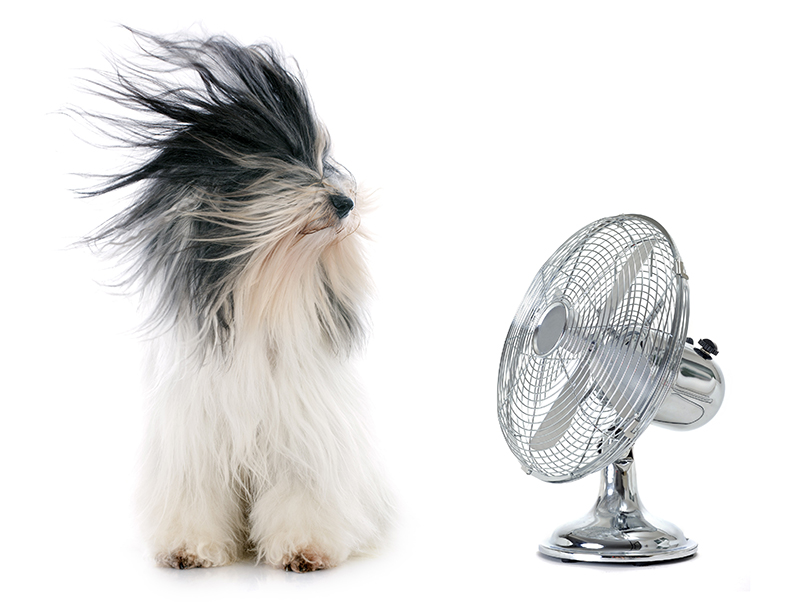
First and foremost, if you have a central air conditioner, you will need to call in a professional to perform an inspection on it. This routine maintenance will include a cleaning. While you may be able to change a filter or clean them when needed, many of the parts that need to be inspected and cleaned are actually inside the sealed unit. The professional, who has received the proper training and has the proper tools, will be able to get inside the unit to inspect and clean it.
A professional inspection of your central air conditioner will include a thorough cleaning of the evaporator coil which is located in the part of the unit located inside your home. This is the part that actually cools the air and, if it is clogged with dust and dirt, you may notice that your unit has restricted air flow. In other words, it is not putting out as much cool air as it normally does.
They will also inspect the condenser unit located outside your home. A problem with the condenser will greatly affect the temperatures in your home. Many issues are caused by outside debris getting inside the unit or a low refrigerant level. As this unit is complex and sealed, the professional should be the one to clean it and perform any routine maintenance. Part of their inspection will also include a cleaning of the fan located inside this outside unit.
If you were to simply shut off your central air conditioning unit this fall and turn it back on in the spring, you may be lucky and nothing would be amiss. Unfortunately, this is not often the case. A lot of dirt and debris can get trapped inside air conditioning units while they are in use and, if left this way, it will cause damage when they first start back up. Even if you do not notice anything immediately, over time, you will see symptoms, including reduced air flow.
A common problem among busy homeowners is that they forget to call to have maintenance performed on their system. One solution to this problem is the air conditioning maintenance plan. The plan includes a thorough inspection and cleaning of your central air conditioning unit, and it affords you the luxury of receiving priority when you call in an emergency. If you do find that your system needs servicing, you will receive a discount for having purchased a maintenance plan.
With the colder season arriving soon in Florida, the last thing you want to do is forget about your air conditioner as you will need it as soon as the weather changes again. In fact, living in Florida offers you that chance that you still may need to have your central air conditioning on in the winter. By performing routine maintenance on it this fall, you can be certain that it will be ready to go whenever you need it. Furthermore, by keeping your central air conditioner in good working order, you can save money as it will be more efficient to operate. Call or Text us today for more details (941) 203-7955 and don't forget to check out our specials on a central air conditioner and heating maintenance. Stay Cool with Mahle!
What is NATE certification for HVAC?
NATE is the HVAC industry standard for technician certification. It is a rapidly growing area with promising career opportunities. HVAC industry in the United States is becoming more competitive by the day and clients are always looking for qualified technicians to attend to their problems. No matter how advanced your HVAC is, its performance and durability depend on the skills of the technician who installs and services it.
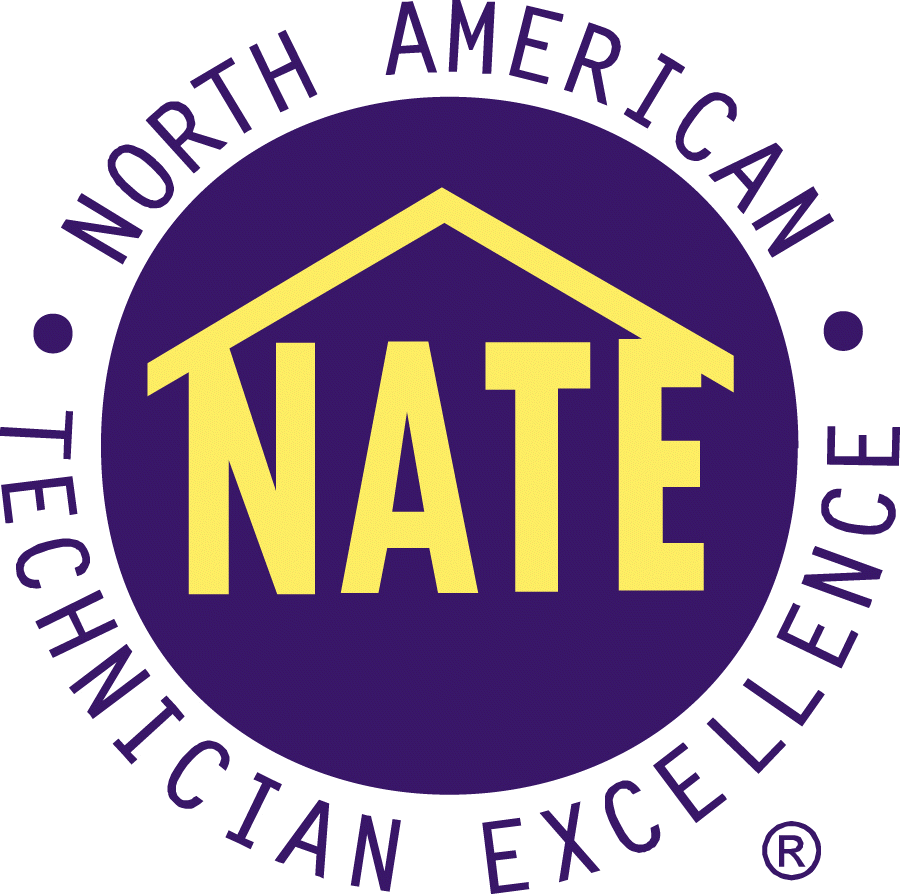 There is a variety of certifications offered by NATE in some specialty areas within the HVAC industry. It is however not mandatory to possess these certifications but a majority of the contractors are familiar with them, and they are always looking for NATE certified technicians. NATE certification covers three areas in the HVAC industry which include installation, service, and senior. The specialty options under the first two categories include:
There is a variety of certifications offered by NATE in some specialty areas within the HVAC industry. It is however not mandatory to possess these certifications but a majority of the contractors are familiar with them, and they are always looking for NATE certified technicians. NATE certification covers three areas in the HVAC industry which include installation, service, and senior. The specialty options under the first two categories include:
- Air distribution
- Air conditioning
- Gas heating
- Hydronics gas
- Oil heating
- Air heat pumps
- Hydronics Oil
- Commercial refrigeration
- Light commercial refrigeration
The last category that is Senior, couples with the HVAC Efficiency Analyst certification. A technician must acquire the first two certifications before being Senior Certified.
Before a technician is issued with the certificate, they must pass two written exams, that is, the core exam and the specialty exam. The core exam consists of fifty multiple choice questions, and the candidate must score at least 70% that translates to 35 correct questions out of the possible 50. The core exam covers areas such as safety, applicable science, tools and much more.
The specialty exam on the other hand consist of hundred multiple questions and the candidate is expected to score at least 70% that is the pass mark. The specialty exam covers areas specific to the field of study.
Benefits of NATE certification
- You get up-to-date knowledge with the changing technology. You also get hands-on experience in handling the latest equipment in the HVAC industry that includes the geothermal systems, hybrid heating, and cooling and the most recent air conditioners.
- You get updated on the latest practices, especially concerning safety.
- You get trained to the customer service to ensure you deliver high-quality services.
- The client can get high-quality service with protection.
- The customer has the assurance that their components are being handled by competent professionals.
Mahle Cool Air is family owned and for a long time, we have been the first choice of homeowners, contractors and builders owing to our top quality equipment and excellent workmanship. We pay close attention to employing qualified and knowledgeable technicians to work with us. Through good service, we help our clients save money and improve their indoor air quality. As a customer, you enjoy the maximum benefits of being served by NATE certified technicians who are eager to attend to your needs. Call or Text us today for more details (941) 203-7955 and don't forget to check out our specials, financing, and rent-to-own air conditioning options. Stay Cool with Mahle!
How do air conditioners work?
When it gets hot outside, turning on the air conditioner is something that most people do without thinking about it. It is certainly a convenient luxury in our day. Knowing how do air conditioners work leads to appreciating these devices even more.
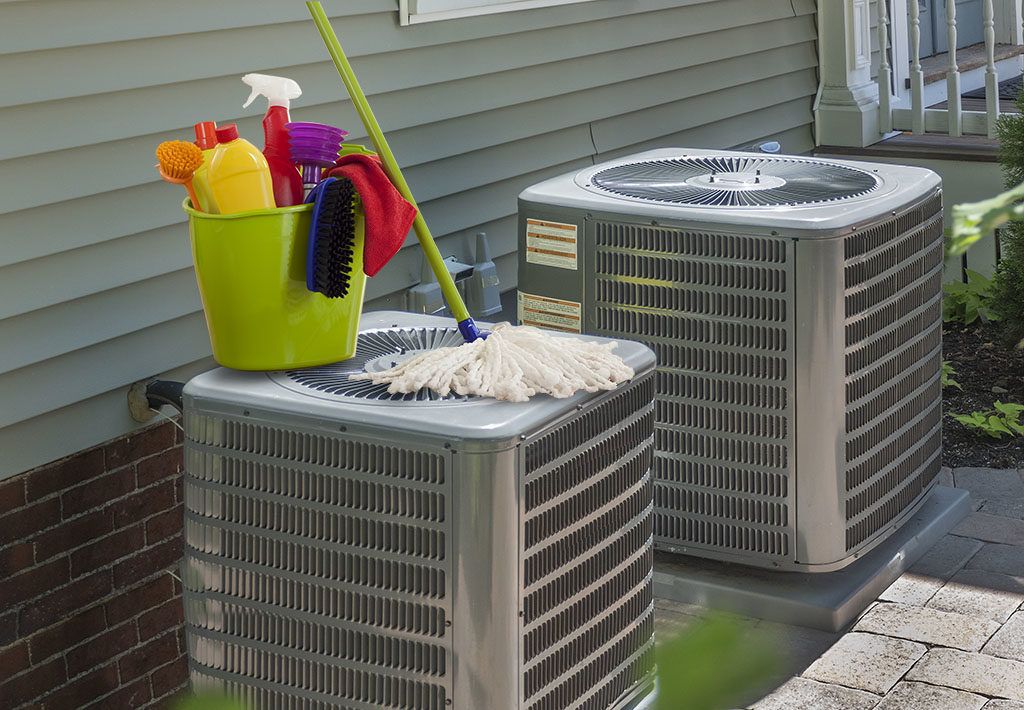
Air conditioners come in all sizes. From small window units in homes to massive multi-story units in commercial buildings, there is a size for every need. Central air conditioners (HVAC) work on the same principles.
Air Conditioners Remove Heat
The basic idea behind an air conditioner is that it removes the heat from a room and transfers it outside. There are four major components in an air conditioner that enable it to work.
The Secret Is in the Coolant
Every air conditioner (AC) uses a chemical that easily changes from a liquid to a gas. It can make this change at rather low temperatures. Whenever it makes the change from a liquid to a gas, it absorbs energy in the form of heat to be able to make the transition. Then, when it transitions back to a liquid, it releases energy in the form of heat.
The Evaporator Coils
Facing the inside of your home is the evaporator coils. This is where the hot air flows over the cold coils, which are low pressure, and turns the liquid into a gas. The fan inside your air conditioner blows the cool air into your home.
The Compressor and Condenser Coils
The compressor unit in an air conditioner compresses the warm gas and pressurizes it, making it hot. This hot gas will then pass through the condenser coils, where it quickly cools. In an HVAC unit, the compressor and coils are located outside. As the gas cools, it releases the heat, and another fan blows the hot air outside. As the heat is released, the gas once again turns back into a liquid.
Because the unit is a closed system, it simply keeps recirculating the gas and liquid, which changes from one state to the other over and over again. A thermostat allows the temperature to be set so that it can be regulated.
The Expansion Valve
In order to keep one side at a higher pressure than the other, an expansion valve is added to the system. This device simply regulates how much coolant flows into the evaporator.
Humidity Is Also Removed
Another excellent feature of an air conditioner is that it removes unwanted humidity. If you look at the cool side of the unit while it is working, you will notice moisture on the coils. This is the humidity in the room condensing on the outside of the coils, which then drops to the bottom of the unit. A drain allows the moisture to pour out toward the outside.
Keeping your home's HVAC unit in good shape is important so that it will work efficiently when needed. Air conditioning experts can keep your home's unit in peak working order. When it is operating correctly, you will be able to save more money. Call or Text us today for more details (941) 203-7955 and don't forget to check out our specials, financing, and rent-to-own air conditioning options.
